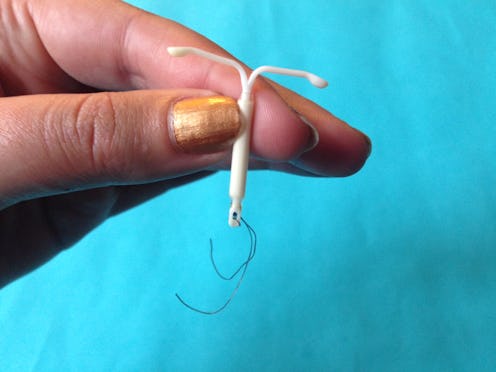Life
Here’s What Science Says About The Connection Between The IUD & Menopause
Chances are you've heard of IUDs, or intra-uterine devices, which are inserted into the uterus to prevent pregnancy. There are two types of IUD: copper IUDs, which make your uterus an inhospitable environment for sperm, and hormonal IUDs, which works like any hormonal contraceptive to prevent ovulation and, in turn, pregnancy. But just as there are numerous questions about how hormones affect your reproductive life down the line, you might be wondering if the IUD affects menopause. You might not currently be thinking about menopause, or perimenopause, but given the long life cycle of an IUD, it's reasonable to want to start thinking about it now.
Menopause itself, the Royal Women's Hospital explains, is "the spontaneous, permanent end to menstrual periods that is not caused by medical treatment or surgery," and currently it's thought that it occurs because we "run out of eggs." People with female reproduction systems are born with around 300,000 eggs, according to the Cleveland Clinic, but only around 300 or 400 of those will ovulate during our lives, and egg levels are finite: they taper off until you have no more, which is when menopause hits. So how could an IUD affect this process — and what should people with IUDs know?
1The IUD Has No Effect On The Start Of Menopause
If you have an IUD, you're not interfering with your egg levels or affecting any of the factors that contribute to menopause. Menopause is a hormonal process; Planned Parenthood notes that it "starts when your ovaries stop making estrogen and slow down making other reproductive hormones, such as progesterone. Without these hormones, you stop getting your period and stop being able to get pregnant."
Copper IUDs don't work hormonally, so theres no way for them to affect this process. Hormonal IUDs, meanwhile, seem like they might affect your menopause schedule, but it turns out that's not correct. "Even if you don’t ovulate, you steadily lose follicles [which produce eggs] as you get older. Mirena — or any other type of contraceptive — doesn’t seem to affect the time it takes to get to menopause," notes Healthline.
2Hormonal Birth Control Of All Kinds Can Alter The Appearance Of Menopause
Hormonal IUDs available in the U.S. use the synthetic hormone progestin to prevent pregnancy, according to Planned Parenthood — and whether you have a hormonal IUD or are taking progestin-only birth control pills, they may alter the appearance of menopause.
"If you're taking the progestogen-only pill, your bleeds may be irregular or stop altogether for as long as you keep taking the pill," explains the National Health Service — and that occurs whether you're in menopause or not.
Same applies to hormonal IUDS; while you've got one, your body will react the same and bleed the same constantly, regardless of whether menopause has happened.
Combined birth control pills, which contain both estrogen and progestin, are more effective at "masking" the effects of menopause than the IUD, but IUDs can still maintain a status quo. "As you approach menopause, your body’s natural estrogen levels will start to decrease — but the pill’s synthetic hormones prevent your body from recognizing this decline," writes Dr. Debra Wilson for Healthline.
3IUDs Can Treat Some Severe Menopause Symptoms — But Not All Of Them
One of the interesting ways in which an IUD can affect menopause is treatment of serious bleeding. Studies have shown that having an IUD inserted while menopause (or perimenopause, the period before menopause occurs) is happening can actually help treat severe bleeding, which can affect up to 25 percent of women in perimenopause. The Mirena IUD is now a recommended treatment if you start bleeding heavily before or during menopause.
It can't do everything, though. For women who are perimenopausal, "the levonorgestrel IUD will also address heavy bleeding and provide contraception but it will not suppress the cycle and therefore does not address symptoms of mastalgia," or breast pain, explains the Australasian Menopause Society.
And hormonal IUDs can cause their own symptoms in menopausal women. The progestin levels, according to Healthline, can cause "tender breasts, headache, cramps or pelvic pain" as hormonal levels fluctuate.
4
If you have a hormonal IUD and are of menopausal age, it might be worth getting a back-up test from your doctor — like one of follicle-stimulating hormone levels in your blood — to indicate whether menopause has actually happened. Whether you have a copper or hormonal version, though, menopause will happen on its own schedule regardless.
